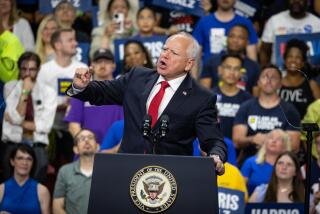Furor Over Military Record Is Over, Quayle Declares
- Share via
BOONVILLE, Mo. — Republican vice presidential candidate Dan Quayle declared Thursday that the furor over his Vietnam-era military record was past, and he tried his best to ignore the issue.
The 41-year-old Indiana senator, who talks tough on defense and foreign policy matters, has vigorously rebutted allegations that he used the clout of his influential publishing family to obtain a safe position in the Indiana National Guard during the Vietnam War.
On Thursday, Quayle said that the enthusiastic reception he had received the night before at a convention of National Guard members in St. Louis proved that he had “turned around” any doubts about his military service.
Issue ‘Behind Us’
Quayle’s comments echoed those of Vice President George Bush, who proclaimed the issue “behind us” when campaigning with Quayle in Ohio last Saturday. And Quayle aides have made similar assertions every day since.
Quayle was met by enthusiastic and partisan crowds as he campaigned in Missouri, stopping to lunch on the $2.95 blue plate special of fried chicken and mashed potatoes at Stephanie’s Steakhouse before driving to the Missouri State Fair to talk to farmers, eye some livestock and shoot some baskets at a hoop on the Midway.
Mixed among the 200 or so supporters who greeted Quayle’s plane at the Columbia, Mo., airport were a few dozen hecklers. They mocked his credibility and character with signs that read, “Sissy Rich Boy,” “War Wimp” and “Quayle: Intensely Mediocre.”
‘Warmonger Ticket’
“I wouldn’t have gone (to Vietnam) either, but I’m not running for vice president on a warmonger ticket,” said Mitch Moore, a 33-year-old Columbia attorney who was among the protesters. “I’m not trying to wrap myself in the flag.”
Later, at a street corner press conference in Boonville, Quayle defended his vote last month against legislation to elevate the Veterans Administration to Cabinet status. On Wednesday, Sen. Lloyd Bentsen, the Democratic vice presidential candidate, said that Quayle had apologized to a veterans’ group on Monday in what amounted to a “deathbed conversion” by a troubled candidate trying to curry favor with veterans.
But Quayle insisted that he had made no such apology and said he still believes the legislation, which was passed, is ill-conceived. “I did not believe that it would enhance benefits or services for the veterans,” he said. “I still believe that.”
And Quayle rejected suggestions by the 67-year-old Bentsen that he was too young and inexperienced to be President should something happen to Bush. “I’m very close to the same age as Jack Kennedy when he was elected, not vice president, but President,” Quayle said.
Critical of Dukakis
Although Quayle had dodged the press on Wednesday, his first solo day on the campaign trail, he answered questions on Thursday and used the occasion to portray Democratic presidential nominee Michael S. Dukakis as a bloodless technocrat whose policies would decimate national defenses.
Quayle joined Bush and other Republicans in condemning Gov. Dukakis for his 1977 veto of state legislation that would have required Massachusetts schoolteachers to lead their students in the Pledge of Allegiance. Dukakis said that he vetoed the bill after legal scholars and a state judicial panel had advised him that it was unconstitutional.
“The governor of Massachusetts to me is a person who does not have an ideology, who does not have a particular philosophy,” Quayle said.
Warning to Farmers
At the Missouri State Fair in Sedalia, Quayle told farmers that the election of a Dukakis Administration would herald the imposition of strict commodity production controls, as called for in controversial farm legislation proposed by Iowa Democratic Sen. Tom Harkin and Rep. Richard A. Gephardt (D-Mo.). During debates with Democratic rivals, including Gephardt, last winter, Dukakis had vigorously opposed the so-called Harkin-Gephardt bill, and a Dukakis spokesman said Thursday that he is still opposed to most parts of it.
When asked later what his own farm policy would be, Quayle seemed a bit rattled. “How the target and deficiency price and all that work?” he asked rhetorically. “I know quite a bit about . . . farm policies. I come from Indiana, which is a farm state. Deficiency payments, which are the key, and that’s what gets the money into the farmers hands. We got loan rates, we got target prices . . . . We spend a great deal of time with farm issues.”
More to Read
Get the L.A. Times Politics newsletter
Deeply reported insights into legislation, politics and policy from Sacramento, Washington and beyond. In your inbox twice per week.
You may occasionally receive promotional content from the Los Angeles Times.










